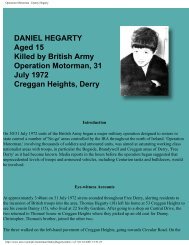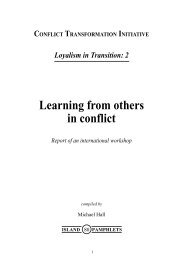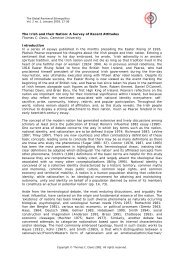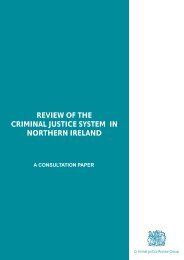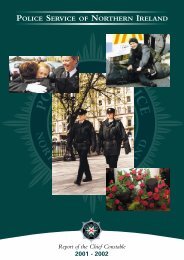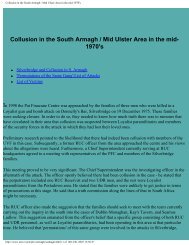11293 report 19 - CAIN - University of Ulster
11293 report 19 - CAIN - University of Ulster
11293 report 19 - CAIN - University of Ulster
Create successful ePaper yourself
Turn your PDF publications into a flip-book with our unique Google optimized e-Paper software.
uilt training college is expedited.The third recommendation deals with the on-going roll-out <strong>of</strong> Information Technology and theassociated training needs that have a cross-over effect on the whole <strong>of</strong> the organisation.Thisrelates to recommendation 144 and is an area <strong>of</strong> risk in view <strong>of</strong> the high cost associated with thistype <strong>of</strong> specialised training (see also Recommendation 93). The Police College has majorresponsibility to provide the necessary skill-sets to meet the introduction <strong>of</strong> state-<strong>of</strong>-the art ITequipment and subsequently requires the resources to maintain this capacity.The fourth incomplete recommendation relates to Recommendation 149, the Pilot Citizenscourse to assess demand in Northern Ireland. While a small recommendation in its own right, theintent was to display openness and transparency, and engage with the community. In light <strong>of</strong> thenew political disposition, it may be timely to reconsider it.Other remaining concerns include:• The importance <strong>of</strong> the Policing Board maintaining an effective system <strong>of</strong> governance overthe Police Service.This includes timely access to reliable, accurate information from thePolice Service. Conscious efforts must continue to be made to evaluate the quality andtimeliness <strong>of</strong> information provided by the Police Service. If there are impediments to anyaccess, they should be analysed and raised at the most senior levels <strong>of</strong> the Police Serviceto ensure they are dealt with expediently.• The need for operational training for firearms will require the deployment <strong>of</strong> a number <strong>of</strong>resources to complete the re-qualification standards on an on-going basis. At the sametime, it may also be useful to review opportunities to maximise range use to meet trainingneeds through innovative training methods, such as extended hours and weekend use. Theorganisation will be expected to dedicate time and effort to meet long-term trainingneeds.• One <strong>of</strong> the single largest strategic concerns <strong>of</strong> both the Police Service and Policing Boardis the capacity to meet current operational and emerging training needs. As restructuringoccurs, there will be a need to carefully manage the change process. This includes ensuringthe timeliness <strong>of</strong> training to meet organisational needs and to ensure that police <strong>of</strong>ficerson the front-line remain a priority.Future Issues and Directions1701. The assumption is that organisational changes originating from the Independent Commission’srecommendations have been institutionalised over the past seven years and are sufficiently wellembedded to survive future challenges. That will be the situation only if there is a continuouslearning environment and ethos created and supported by a properly focused, skilled andresourced training regime. All this speaks to capacity and sustainability and the Policing Board’soversight in this area to ensure that training does not become focused on discrete outputs, asopposed to the outcomes envisioned by the Independent Commission. It is also worth notingthat the young cohort that has been trained since 2001 represents the future <strong>of</strong> policing inNorthern Ireland and this investment must continue to be developed according to what is







